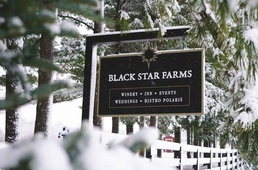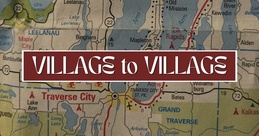
Northport’s Tibetan Yak
Move Over, Bison — Now There’s Something Leaner
By Al Parker | Aug. 12, 2017
Chris Butz has some advice to beef lovers: “Try yak, you’ll never go back.”
Butz, who raises Tibetan yaks at Gill’s Pier Ranch, just outside Northport, contends that yak meat is where the next culinary movement is at.
“It’s grass-fed and environmentally friendly while also being high in protein and omega 3 and 6,” said Butz. “And it’s 97 to 98 percent fat free and low in cholesterol.”
Studies support the health benefits of Tibetan yak meat, which features a deep red color with very little marbling, due to the fact that the animal’s fat layer is developed externally rather than internally.
Like beef, typical yak cuts include the sirloin, ribeye, tenderloins, roasts, ribs, and stew meat. But with roughly one-sixth the fat content of beef, yak meat is uniquely tender.
“It’s like bison or elk, only sweeter,” said Butz.”It’s a very filling meat. I tried a half-pound burger once and was really stuffed. With two pounds of ground yak, we can feed our family of seven and have some left over. A quarter-pound or third-pound burger is plenty. It doesn’t need a lot of seasoning, or you lose the natural sweetness. Just the straight meat to taste the flavor.”
Thirty years ago there was just a handful of yak on exotic animal farms in Europe and ranches in Canada, but virtually none in the United States. Today industry members estimate there are at least 7,500 yaks being raised in North America, from Alberta Canada, to Tennessee. Yak farmers regularly supply specialty restaurants, co-ops, and butcher shops with the grass-fed meat.
Locally, Butz sells his yak meat at his Gill’s Pier Ranch and at the farmers markets in Suttons Bay and Northport. “The farmers markets have been a huge boost to our sales,” he said. “We sell a lot of ground yak, sausage, jerky, and meat sticks there.”
Butz also supplies yak meat to The Mercantile in Leland and to Bogey’s at the Leland Lodge. “Bogey’s sold over 1,000 yak burgers last year,” said Butz.
Noted chef Mario Batali stops by the ranch to pick up yak hot dogs and gives them a special treatment. “He’s bought a ton of our hot dogs, which are 80 percent ground yak and 20 percent pork,” said Butz. “He made some yak hot-dog pot stickers recently. Also, he poaches them in water and then puts them on the grill. If you don’t boil them or poach them and go straight to the grill, they dry out a bit.”
Butz prices his tenderloin steaks at $40 a pound, ribeyes at $30 a pound, and sirloins at $25 a pound. A one-pound log of summer sausage is $20, while ground yak is $10 per pound. Jerky prices vary per packet by weight.
In addition to providing meat, yak also is a source of milk, which is creamy in color with a fat content of 5 to 7 percent. Yak milk can be processed into butter, cheese or yogurt.
A self-described “recovering lawyer,” Butz moved to Leelanau County from Indiana in 2007. He and his wife, Angie, along with five children, operate the ranch, where they raise alpaca along with the yaks.
Yak meat is a growing trend across the country, and Butz compares it to another lean meat. “We’re where bison was 30 years ago,” he said. “This is our third year of selling yak meat, and it’s gotten better every year. We’re on track to more than double last year’s sales.”
During their first year of selling yak, Gill’s Pier Ranch processed 12 animals; last year, they processed 15. This year they expect to finish with about 20 animals processed.
To keep the meat supply coming, Butz keeps about 30 yaks, including one bull, Chugach, at the Northport ranch, and another 60 at a friend’s ranch in western Kansas. Every so often he drives there to pick up a few yak and trailers them to northern Michigan. An 800-pound yak will yield 250–300 pounds of meat. Butz has the meat processed at RRR Processing in Buckley.
“There’s definitely been a growth spurt in the past five years, and a dispersion geographically,” said Jim Watson, president of the International Yak Association, a group that started in 1992 with 15 member families and recently hit 100 members. Watson has been raising yak in Montana since 2001.
Western states have been yak strongholds, but the IYA is now seeing growth in states like New York and Vermont, along with California and Washington, according to Watson. One Texas rancher is even raising yak near Dallas, although the shaggy animals often struggle with the heat and humidity of the Lone Star State.
Despite their growth, yak numbers are still not even close to those of bison. The U.S. bison herd is estimated at 220,000 by the National Bison Association; and bison meat sales totaled $278 million in retail stores and restaurants across the nation.
Find Gills Pier Ranch at 5620 North Manitou Trail To learn more, visit www.gillspierranch.com or call 231 256-7355.
Trending

Having a Latte Fun at Mundos
Art? Coffee? Both! Whether you’re a professional barista or just an at-home coffee lover, try your hand at the Lucha L… Read More >>
Lessons in (Wine) Chemistry
Challenge yourself to learn something new this winter…bonus points if that new hobby is A) delicious and B) makes lef… Read More >>
Elk Rapids and GT Commons Kick Off "Village to Village" Winter Campaign
The Village at Grand Traverse Commons and the Village of Elk Rapids are about 20 miles apart. Not a long drive on a summer&r… Read More >>


